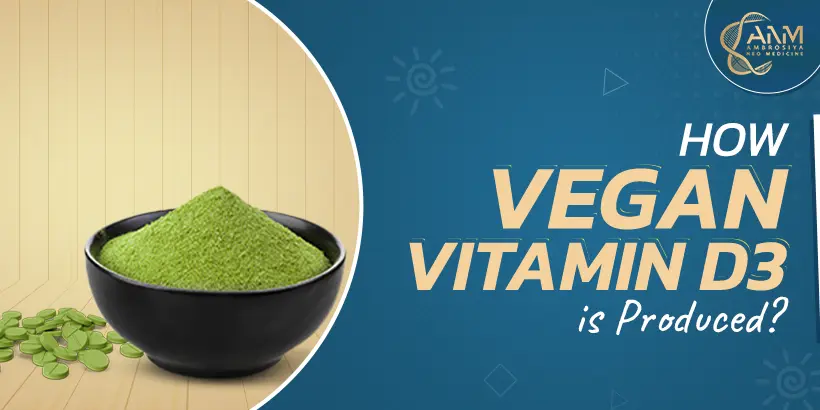How Vegan Vitamin D3 is Produced?
Vitamin D3, also known as cholecalciferol, plays a crucial role in maintaining overall health and well-being. Traditionally, vitamin D3 has been derived from animal sources like lanolin or fish oil. However, with the rise in veganism and the demand for plant-based alternatives, the production of vegan vitamin D3 has gained significant attention. In this article, we will explore the process of producing vegan vitamin D3, its sources, advantages, and the role it plays in supporting optimal health.
Understanding Vitamin D3:
When sunlight touches the skin, it triggers the synthesis of Vitamin D3, which is a type of vitamin that dissolves in fat. It is also obtained through certain dietary sources such as fatty fish, egg yolks, and fortified dairy products. Vitamin D3 is vital for maintaining healthy bones, supporting immune function, regulating mood, and promoting overall well-being.
Plant-Based Vitamin D3:
Vegan vitamin D3 is a plant-based alternative to animal-derived sources. It is a suitable option for individuals following a vegan or vegetarian lifestyle. Plant-based vitamin D3 is typically sourced from lichen, algae, or mushrooms, which contain naturally occurring cholecalciferol.
Sources of Plant-Based Vitamin D3:
1. Lichen as a Source of Vitamin D3:
Lichen, a symbiotic organism formed by the combination of fungi and algae, is a common source of vegan vitamin D3. Lichens have the ability to produce cholecalciferol when exposed to sunlight, making them an excellent vegan-friendly source.
2. Algae-Based Vitamin D3:
Certain types of algae, such as marine microalgae, naturally produce vitamin D3. These algae are cultivated in controlled environments and undergo a process to extract and purify the cholecalciferol content.
3. Mushroom-Derived Vitamin D3:
Certain varieties of mushrooms, when exposed to ultraviolet (UV) light, can naturally synthesize vitamin D2, which can be converted to vitamin D3 in the body. Mushroom-derived vitamin D3 offers a vegan-friendly source of this essential nutrient.
The Process of Producing Vegan Vitamin D3:
The production of vegan vitamin D3 involves several key steps:
1. Cultivation of Lichen and Algae:
Lichen and algae are cultivated in controlled environments to ensure optimal growth and nutrient absorption. They are carefully monitored to maintain the right conditions for vitamin D3 synthesis.
2. Extraction of Vitamin D3 from Lichen and Algae:
Once the lichen or algae have reached the desired stage of growth, they undergo an extraction process to isolate the vitamin D3. This process may involve solvents, purification techniques, and careful handling to ensure the purity and potency of the extracted compound.
3. Conversion and Standardization:
In some cases, the extracted vitamin D3 may be in the form of vitamin D2, which is then converted to vitamin D3 through a chemical process called hydroxylation. The resulting vitamin D3 is standardized to meet specific potency requirements and quality standards.
Quality Control and Certification:
Ensuring the quality and safety of vegan vitamin D3 products is of utmost importance. Manufacturers follow strict quality control protocols to maintain consistency and purity. Third-party certifications, such as those from reputable regulatory bodies, validate the authenticity and quality of vegan vitamin D3 products. These certifications provide consumers with confidence in the efficacy and safety of the supplements they choose.
Comparing Vegan Vitamin D3 with Animal-Derived Vitamin D3:
1. Efficacy and Absorption Rates:
Research suggests that vegan vitamin D3 derived from lichen or algae exhibits similar efficacy and absorption rates to animal-derived vitamin D3. The body can convert both forms into an active metabolite that supports various biological functions.
2. Sustainability and Environmental
Impact:
The production of vegan vitamin D3 from plant sources generally has a lower environmental impact compared to animal-derived sources. Cultivating lichen, algae, and mushrooms requires fewer resources and reduces the carbon footprint associated with traditional methods.
3. Allergies and Sensitivities:
Vegan vitamin D3 provides an alternative for individuals who have allergies or sensitivities to animal-derived sources. It allows them to meet their nutritional needs without compromising their dietary preferences or health considerations.
Vegan Vitamin D3 in Dietary Supplements:
Vegan vitamin D3 is available in various forms, including capsules, tablets, drops, and fortified foods. These supplements provide a convenient way to ensure adequate vitamin D3 intake for individuals following a vegan or vegetarian diet.
Health Benefits of Vegan Vitamin D3:
1. Support for Bone Health:
Vitamin D3 is essential for the absorption and utilization of calcium and phosphorus, which are vital for maintaining healthy bones and teeth. Adequate vitamin D3 levels support bone mineralization and help reduce the risk of osteoporosis and fractures.
2. Immune System Function:
The modulation of immune function is a critical role carried out by Vitamin D3. It helps regulate immune responses, supports the body’s defense against pathogens, and may contribute to overall immune system health.
3. Mental Health and Well-Being:
Emerging research suggests that vitamin D3 may play a role in supporting mental health and well-being. Adequate levels of vitamin D3 are associated with improved mood, reduced risk of depression, and enhanced cognitive function.
Incorporating Vegan Vitamin D3 into a Balanced Diet:
While vegan vitamin D3 supplements are a valuable source of this nutrient, incorporating naturally occurring sources into your diet is also beneficial. Foods fortified with vegan vitamin D3, such as plant-based milk, cereals, and tofu, can contribute to your overall vitamin D3 intake. Additionally, exposure to sunlight for a short period each day can help your body naturally synthesize vitamin D3.
Conclusion:
Vegan vitamin D3 offers a plant-based alternative to animal-derived sources, catering to the growing demand for ethical and sustainable choices. Through careful cultivation, extraction, and standardization processes, plant-based vitamin D3 can be produced to meet the nutritional needs of individuals following a vegan or vegetarian lifestyle. By understanding the benefits, sources, and production methods of vegan vitamin D3, individuals can make informed choices to support their overall health and well-being.

